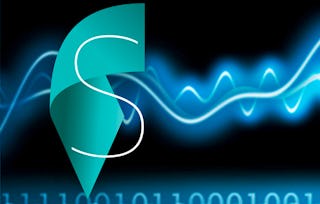Digital Signal Processing is the branch of engineering that, in the space of just a few decades, has enabled unprecedented levels of interpersonal communication and of on-demand entertainment. By reworking the principles of electronics, telecommunication and computer science into a unifying paradigm, DSP is a the heart of the digital revolution that brought us CDs, DVDs, MP3 players, mobile phones and countless other devices.

Digital Signal Processing 2: Filtering

Digital Signal Processing 2: Filtering
This course is part of Digital Signal Processing Specialization


Instructors: Paolo Prandoni
20,035 already enrolled
Included with
195 reviews
What you'll learn
Digital filters, how they work
Digital filter design
Adaptive signal processing
Skills you'll gain
Details to know

Add to your LinkedIn profile
3 assignments
See how employees at top companies are mastering in-demand skills

Build your subject-matter expertise
- Learn new concepts from industry experts
- Gain a foundational understanding of a subject or tool
- Develop job-relevant skills with hands-on projects
- Earn a shareable career certificate

There are 3 modules in this course
How digital filters work in time and in frequency.
What's included
13 videos12 readings1 assignment2 ungraded labs1 plugin
Learning how to choose and design the right filter using the z-transform and numerical tools.
What's included
13 videos11 readings1 assignment2 ungraded labs1 plugin
Analyzing and processing random signals and designing filters that adapt to unknown inputs.
What's included
8 videos6 readings1 assignment1 ungraded lab1 plugin
Earn a career certificate
Add this credential to your LinkedIn profile, resume, or CV. Share it on social media and in your performance review.
Instructors

Offered by
Explore more from Electrical Engineering
 Status: Free Trial
Status: Free TrialÉcole Polytechnique Fédérale de Lausanne
 Status: Free Trial
Status: Free TrialÉcole Polytechnique Fédérale de Lausanne
 Status: Free Trial
Status: Free TrialÉcole Polytechnique Fédérale de Lausanne
 Status: Free Trial
Status: Free TrialÉcole Polytechnique Fédérale de Lausanne
Why people choose Coursera for their career

Felipe M.

Jennifer J.

Larry W.

Chaitanya A.
Learner reviews
- 5 stars
80%
- 4 stars
12.30%
- 3 stars
4.10%
- 2 stars
2.05%
- 1 star
1.53%
Showing 3 of 195
Reviewed on Oct 7, 2020
Best material on Signal Processing. Instructors emphasized on concepts. This course is enjoyable
Reviewed on Sep 4, 2020
Add some numerical problems and solve them in your video lectures for the better understanding of concepts.
Reviewed on May 16, 2024
Excellent content. Right mix of mathematics formulation and implementation.

Open new doors with Coursera Plus
Unlimited access to 10,000+ world-class courses, hands-on projects, and job-ready certificate programs - all included in your subscription
Advance your career with an online degree
Earn a degree from world-class universities - 100% online
Join over 3,400 global companies that choose Coursera for Business
Upskill your employees to excel in the digital economy
Frequently asked questions
To access the course materials, assignments and to earn a Certificate, you will need to purchase the Certificate experience when you enroll in a course. You can try a Free Trial instead, or apply for Financial Aid. The course may offer 'Full Course, No Certificate' instead. This option lets you see all course materials, submit required assessments, and get a final grade. This also means that you will not be able to purchase a Certificate experience.
When you enroll in the course, you get access to all of the courses in the Specialization, and you earn a certificate when you complete the work. Your electronic Certificate will be added to your Accomplishments page - from there, you can print your Certificate or add it to your LinkedIn profile.
Yes. In select learning programs, you can apply for financial aid or a scholarship if you can’t afford the enrollment fee. If fin aid or scholarship is available for your learning program selection, you’ll find a link to apply on the description page.
More questions
Financial aid available,

